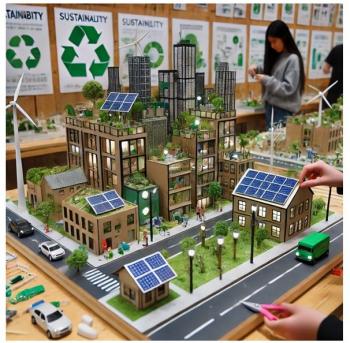Find It Fund It Florida - Hillsborough Education Foundation
Build a Sustainable Future: City Model Project

- School:
- New Springs School K-8
- Category:
- Stem
- Teacher/
Administrator: - John Mark Barbado
- 19964
- Students Impacted:
- 20
- Grade Levels Impacted:
- 6-8
- Date:
- October 21, 2024
Investor
Thank you to the following investor for funding this grant.
Hillsborough Education Foundation - $302.00
Project Goal
Students will design and construct a compact model of a sustainable city using recycled materials. This hands-on project aims to enhance their understanding of sustainability, urban planning, and teamwork within a STEM framework.
Category
Learning Aids - Sunshine state book sets, robotics kits, puzzle boards, science models, engineering supplies, etc.
How Project Benefits Students
• Enhanced Learning Experience: This project will immerse students in sustainability concepts, promoting environmental literacy and awareness. They will explore how their choices impact the planet, fostering a sense of responsibility and stewardship.
• Community Engagement: The culminating presentations at the Science Fair and STEM Night will provide an opportunity for students to share their work with parents and the community, fostering pride in their accomplishments and encouraging public dialogue about sustainability.
• Development of Critical Skills: This initiative promotes collaboration, creativity, and problem-solving—skills that are increasingly vital in the 21st century. Students will learn to work effectively in teams, consider diverse perspectives, and apply their knowledge to innovate solutions.
• Real-World Relevance: By linking classroom learning to real-world sustainability challenges, students will appreciate the importance of STEM education in addressing global issues. They will gain insights into career paths in environmental science, engineering, and urban planning, inspiring future aspirations.
Expected Outcome(s)
Anticipated Outcomes:
1. Support the Goals: This project aligns with educational standards by fostering an understanding of environmental science and sustainability, critical in today’s society. Students will learn how urban design can address pressing issues like climate change and resource depletion, preparing them to become responsible global citizens.
2. Curriculum-Based: By integrating various STEM disciplines—science, technology, engineering, and mathematics—this project creates a holistic educational experience. Students will apply theoretical concepts in a practical context, enhancing their comprehension and retention of complex subjects.
3. Number of Students Impacted: The project will directly benefit 20 students, who will collaborate in groups of five. This collaborative environment fosters teamwork, communication, and social skills, crucial for their personal and academic growth.
4. Measurable Outcomes: Each group will produce a model that demonstrates specific sustainability features, such as energy-efficient buildings and green transportation options. The effectiveness of these designs will be assessed using a detailed rubric, ensuring that students understand the principles behind their creations.
5. Enrichment Experience: Beyond academic knowledge, this project provides an enriching experience that cultivates essential life skills. Students will enhance their critical thinking by solving real-world problems, engage in creative brainstorming, and develop resilience by iterating on their designs based on feedback.
6. Teacher Innovation: This project encourages innovative teaching methods that go beyond traditional classroom instruction. By facilitating a hands-on project, teachers can ignite student passion for STEM fields, showcasing the practical applications of their studies.
7. Cost per Student Ratio: With an estimated total cost of $302.00, the project equates to approximately $15.1 per student. This cost-effective approach ensures that we maximize educational benefits while utilizing available resources responsibly.
Detailed Cost Summary
Materials Needed
1. Recycled and Reusable Materials:
o Cardboard (8 sheets): $24.00
o Plastic containers (12 containers): $12.00
o Recycled paper (40 sheets): $10.00
o Aluminum foil (4 rolls): $8.00
o Toothpicks and Popsicle sticks (4 packs): $16.00
o Corks (40 corks): $4.00
o Fabric scraps (4 bags): $8.00
o Egg cartons (8 cartons): $8.00
o Yarn or string (4 rolls): $8.00
o Clay or Play-Doh (4 packs): $12.00
o Paint (1 set): $10.00
2. Renewable Energy Model Components (Optional):
o Small solar panels (4 panels): $60.00
o LED lights (40 lights): $30.00
o Small motors (4 motors): $20.00
3. Tools for Assembly and Detailing:
o Scissors (4): $12.00
o Glue (4 bottles): $12.00
o Rulers and measuring tape (4 each): $8.00
o Markers/colored pencils (4 packs): $20.00
o Tape (4 rolls): $8.00
o Poster boards (4 boards): $12.00
Total Estimated Cost
• Total Materials Cost (with optional items): $302.00
Items
| # | Item Description | Total Cost |
|---|---|---|
| 1 | Cardboard (8 sheets) | $24.00 |
| 2 | Plastic containers (12 pcs) | $12.00 |
| 3 | Paper/recycled papers (40 sheets) | $10.00 |
| 4 | Aluminum foil (4 rolls) | $8.00 |
| 5 | toothpicks and popsicle sticks (4 packs) | $16.00 |
| 6 | Corks (40 pcs) | $4.00 |
| 7 | Fabric scraps (4 bags) | $8.00 |
| 8 | egg cartons (8 cartons) | $8.00 |
| 9 | Yarn/ string (4 rolls) | $8.00 |
| 10 | clay/ play-doh (4 packs) | $12.00 |
| 11 | Paint (1 set) | $10.00 |
| 12 | Small solar panels (4 panels) | $60.00 |
| 13 | LED lights (40 lights) | $30.00 |
| 14 | Small motors (4 motors) | $20.00 |
| 15 | Rulers and measuring tapes (4 each) | $8.00 |
| 16 | Scissors (4 each) | $12.00 |
| 17 | Glue (hot/craft) 4 bottles | $12.00 |
| 18 | Markers (4 packs) | $20.00 |
| 19 | Masking Tape (4 rolls) | $8.00 |
| 20 | Poster boards (4 pcs) | $12.00 |
| Total: | $302.00 |

Share
Please share this page to help in fulfilling this grant.
Email to a Friend